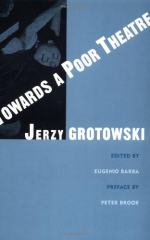
|
| Name: _________________________ | Period: ___________________ |
This test consists of 15 multiple choice questions and 5 short answer questions.
Multiple Choice Questions
1. In "The Theatre's New Testament," Grotowski says that it is "far less risky to be Mr. Smith all one's life than to be" _____.
(a) Van Gogh.
(b) Mozart.
(c) Picasso.
(d) Rembrandt.
2. Who does Grotowski say asked the key methodological questions of acting in "Towards a Poor Theatre" (Chapter 1)?
(a) Stanislavski.
(b) Chekhov.
(c) Brecht.
(d) Artaud.
3. Grotowski's "holy actor" does not sell his body but _____ .
(a) Retains it.
(b) Sacrifices it.
(c) Destroys it.
(d) Represses it.
4. What do the people surrounding the Prince wear in "The Constant Prince"?
(a) Gowns.
(b) Robes.
(c) Military uniforms.
(d) Togas.
5. What does Grotowski refer to contemporary theatre, or "synthetic theatre" as in "Towards a Poor Theatre" (Chapter 1)?
(a) Rich Theatre.
(b) Contemporary Theatre.
(c) Modern Theatre.
(d) Artsy Theatre.
6. Grotowski states in "Theatre is an Encounter", that when we think of Chekhov, we think of his plays in whose style?
(a) Stanislavski's.
(b) Meyerhold's.
(c) Chekhov's.
(d) Dostoevsky's.
7. Who developed bio-mechanical training for the actor?
(a) Meyerhold.
(b) Brecht.
(c) Stanislavski.
(d) Beckett.
8. Who wrote the original script of "Dr. Faustus"?
(a) Marlowe.
(b) Molière.
(c) Grotowski.
(d) Shakespeare.
9. What does Grotowski say that he and his actors are trying to avoid in "Towards a Poor Theatre" (Chapter 1)?
(a) Avant-garde.
(b) Tradition.
(c) Eclecticism.
(d) Progress.
10. Who is the author of "The Constant Prince"?
(a) Calderon.
(b) Shakespeare.
(c) Marlowe.
(d) Artaud.
11. When was the interview in "Towards a Poor Theatre" (Chapter 1) first published?
(a) 1965.
(b) 1966.
(c) 1960.
(d) 1962.
12. What is the name of the Devil in "Dr. Faustus"?
(a) Mephistopheles.
(b) Zephyr.
(c) Satan.
(d) Beelzebub.
13. What Polish Romantic poet transcribed the version of "The Constant Prince" which Grotowski produced?
(a) Stanislaw Scierski.
(b) Julius Slowacki.
(c) Jerzy Grotowski.
(d) Ludwik Flaszen.
14. Who wrote "Akropolis"?
(a) Wyspianski.
(b) Calderon.
(c) Grotowski.
(d) Kalidasa.
15. Who does Grotowski say theorized that the theatre should be a synthesis of all the arts?
(a) Kranikav.
(b) Brecht.
(c) Wagner.
(d) Stanislavski.
Short Answer Questions
1. What director proposed an autonomous theatre "vis-à-vis literature," according to Grotowski in "Theatre is an Encounter"?
2. What is the term for Brecht's "alienation effect"?
3. Who did Artaud write a letter to which said, "I am not entirely myself?"
4. Grotowski states in "Theatre is an Encounter" that Meyerhold's production of "The Inspector General" was a sort of collage of the texts of _____.
5. What does Grotowski define as "not a collection of skills but an eradication of blocks?"
|
This section contains 373 words (approx. 2 pages at 300 words per page) |

|




